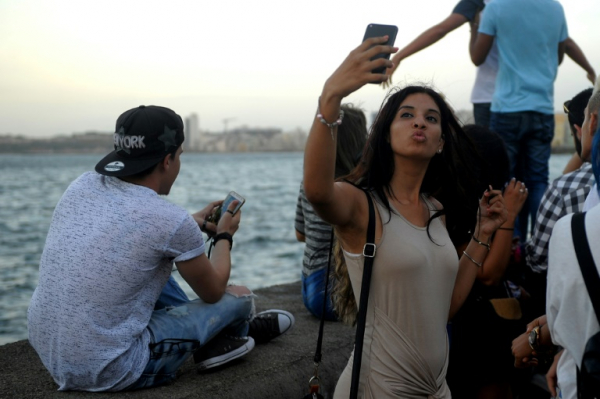
A young Cuban woman, part of a generation preparing for a future after the Castro brothers, is seen taking a selfie recently on Havana’s Malecon esplanade © Yamil LAGE – AFP/File
They are the children of the new millennium. Like their parents, they have known no leader but the Castro brothers. Now, on the eve of a historic generational change, Cuba’s young people hold conflicting opinions about a future they will help to forge.
The island’s youth tend to see the announced departure of President Raul Castro, who will pass the mantle of leadership to a new generation on April 19, as natural and necessary.
“Many generations have passed since the revolution (of 1959) triumphed,” said communications major Hayla Torres, evoking 86-year-old Raul Castro and other members of the revolutionary old guard.
“But they are people of another time, and society is demanding change,” added the 19-year-old from western Matanzas province, who wore a Real Madrid team shirt tied around her waist.
For the first time in more than 40 years, the Cuban president will not be named Castro and will not come from the generation that spearheaded the revolution. For now, the government’s current number two, 57-year-old Miguel Diaz-Canel, is expected to assume the top role.
“Time has passed,” said Yoendris Alarcon, a 22-year-old student at the aptly named University of the Isla de la Juventud (Isle of Youth) in southwest Cuba, adding that it was time to give a new generation a chance to “take Cuba forward.”
“I have confidence in our future,” Torres added. “I believe that despite everything that has been happening, one can see the results of things.” She praised the first reforms undertaken by Raul Castro to “update” the Cuban economic model.
In this March 17, 2015 file photo, Cuba’s President Raul Castro listens to the playing of national hymns during his welcome ceremony at Miraflores presidential palace before the start of an emergency ALBA meeting in Caracas, Venezuela. Castro called President Donald Trump’s new policy on Havana a setback for Cuba-U.S. relations on Friday, July 14, 2017, but said he was willing to continue normalizing ties on a basis of mutual respect. (AP Photo/Ariana Cubillos, File)
‘Everything will stay the same’
Others, however, were quick to express their reservations about Raul Castro’s legacy and the changes that can be expected ahead.
“At the rate things are going, I do not think we’ll see improvement,” said Marlon Borrero, 19, who is doing his compulsory military service. “I think everything will stay the same.”
“Life is complicated for my family,” he said, adding that there was little work available and “if you don’t work, you don’t live.” Just to keep up one’s weight, Borrero said, “almost requires magic.”
The son of a public official, Borrero plans to pursue a career in tourism, probably working “more abroad than in Cuba.”
He hopes that will take him to the United States, “because whatever you say, there is a better way of life there. You work a little more, but in the end the sacrifice is worth it,” said Borrero, a hip-hop fan who sports tattoos and wears earrings and who had decided to grant himself a day off.
Yoel, a 24-year-old unemployed youth in Havana, said he, too, is skeptical of promised change, and he rejects Cuba’s indirect voting system to elect a new president, saying it was designed to keep power in the hands of those who already have it.
“The people play no part in that vote, so we continue on the same path,” he said. “We will never see change.”
‘Nothing is impossible’
Yet while many young Cubans are not optimistic, they realize that the island’s future rests partly on their shoulders, and they say they are ready to take up the burden.
“The young people of Cuba can contribute,” said Luis Orlando, a physical education student, as he walked the streets of the south-central city of Cienfuegos. “We need to take this revolution forward.”
“I understand that we have to open ourselves more to other countries, market ourselves better… and leave the old thoughts behind if we are to make Cuba better,” said Orlando, a soccer fan.
Hayla agreed. “The Cuban economy has declined, but nothing will lower the spirit” of the island’s youth, who are ready to “play their part,” she said.
“Nothing is impossible,” added Yoendris. “We are going to keep fighting. Everything depends on us putting our heads down and staying in the fight.” MKH
RELATED STORIES:
Raul Castro spends 85th birthday preparing for summit
Fidel Castro, Cuban leader who defied US for 50 years, dies at 90